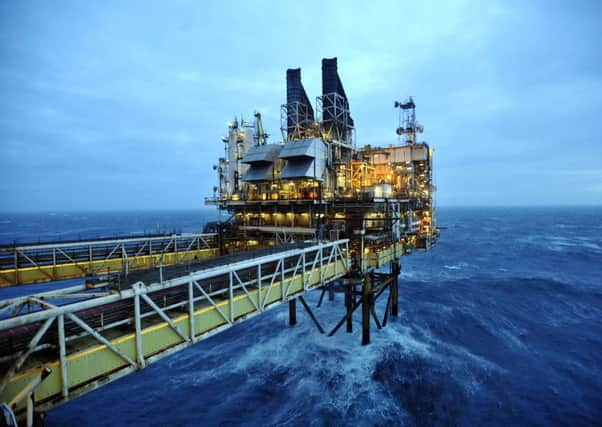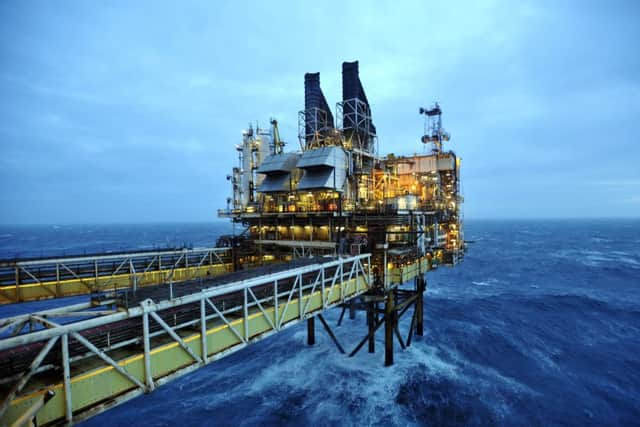North Sea oil facing ‘biggest crisis in 50 years’


The annual Oil and Gas UK activity survey, published yesterday, said the past three years have seen the lowest rate of exploration activity in the UK continental shelf’s history and the “clock is ticking” for Britain’s most important industry.
Malcolm Webb, chief executive of Oil & Gas UK, the representative organisation for the industry, said that, with only 15 exploration wells drilled last year, compared with 44 six years ago, the future of the industry was “now at risk”.
Advertisement
Hide AdAdvertisement
Hide Ad“Even if currently planned wells proceed, the rate of drilling is still too low to recover even a fraction of the estimated six to nine billion barrels yet to be found,” Mr Webb said.


“Britain’s waters contain an abundance of oil and gas yet to be found and it is critical we find the means to turn the current state of exploration around. Rig availability and access to capital are the two main barriers noted by our members.”
The slump in exploration came despite relatively healthy figures for investment and production. Capital expenditure of about £13 billion is forecast for this year, with spending expected to stay above £10bn next year.
In his introduction to the report, Mr Webb writes: “The UK offshore oil and gas industry remains the country’s largest industrial investor, paying more tax into the Exchequer than any other corporate sector and with the potential to deliver huge economic benefit for the UK over the coming decades.
“The energy we extract from the UK Continental Shelf (UKCS), the thousands of companies in the supply chain that support us, the technology, skills and services developed domestically and exported to more than 100 countries are testament to what we have achieved. However, our industry can only continue to compete globally if we have a strong home market for oilfield goods and services, serving a healthy offshore business here in the UK. This future is now at risk.”
In 2013, only 15 exploration wells were drilled, discovering just 80 million barrels, the report states. This year, 25 exploration wells are planned – still far below the 44 drilled just six years ago, and even if all the wells proceed, “the rate of drilling is too low to recover even a fraction of the potential resources”, according to the survey.
Mr Webb states: “In 2013, capital investment reached an impressive £14.4bn and, thanks to a number of large projects now under way, investment is likely to remain above £10bn until 2015. However, on current projection, overall investment by 2016 to 2017 will fall to half that of 2013. ”
Earlier this week, the UK government pledged to fast-track a “game-changing” blueprint for Britain’s oil and gas industry, drawn up by retired oil tycoon Sir Ian Wood, which is set to unlock an extra £200bn for the UK economy over the next 20 years.
Advertisement
Hide AdAdvertisement
Hide AdThe reforms will be spearheaded by a new industry regulator aimed at maximising the recovery of untapped reserves in the UKCS through co-operation between rival energy giants and the government, and more efficient exploration, development and production in the North Sea.
Mr Webb said: “There is very strong support across industry for this new paradigm. Given this, and trusting government is also minded to embrace this fundamental change in approach, there can be real grounds to believe the decline of recent years will be arrested and we will again enjoy sustainable growth in investment, jobs and production.” But he warned: “There is no time to lose. We need to implement these changes without delay. The clock is ticking.”
Tom Greatrex, Labour’s shadow energy minister and MP for Rutherglen and Hamilton West, said: “Oil & Gas UK’s authoritative activity survey makes clear that the UKCS demands greater investment for diminishing returns – operational spending has increased 16 per cent, with production down 8 per cent. North Sea oil is, by record, volatile and, by definition, declining.”
But Maureen Watt, the local SNP MSP, said: “With the second-highest level of capital investment in the history of our oil and gas sector being forecast for this year, today’s report confirms that the industry continues to have a bright future ahead of it.”
COMMENTARY
Mike Tholen: Our job is to explore for oil and gas reserves and if we don’t do enough our future is shaky
Exploration and appraisal drilling has had a wild ride over the past few years. Until 2009, exploration was increasing and appraisal was increasing and the UKCS looked to be a pretty active basin, getting more active, compared with a low point of about ten years ago.
But since then exploration and appraisal have both fallen back. And we are now at a low point on exploration activity.
And that is a pity because the day job for our industry is to go exploring for new oil and gas reserves and develop them. And if we don’t do enough exploration, our future looks more shaky.
Advertisement
Hide AdAdvertisement
Hide AdLast year we had originally expected something like 35 to 40 exploration wells, but we only saw 15. And that is having knock-on effects on companies’ objectives. We need to see a step increase to the low 30s at least in exploration drilling to get to where we want to get to.
The particular challenge in the northern North Sea is that if we don’t crack the pace now and get some of these new volumes of oil and gas identified and appraised, then people will inevitably want to take infrastructure away because they can’t hang around forever. So the clock is ticking between the pace of discovery and development and the desire to decommission the North Sea.
But on the positive side there is a lot of demand for exploration wells and appraisal drilling and the question is how successful we will be in 2015 and 2016. We think there will be something like 25 exploration wells this year and another 11 appraisal wells. So we hope to see things begin to pick up.
The report, however, also shows that over the past four years we have seen a big wave of investment pick up to about £6 billion a year, and together those new developments in major new fields will deliver three billion barrels over time.
The challenge for us is to see this huge wave continue in the years ahead and converted into new production. Last year was a very strong year for investment, this year will be a good year and so will next year. The question is what then comes after 2015-16. It is now 50 years since activity started in the North Sea and there is good opportunity still ahead of us – something between 12 and 24 billion barrels of opportunity. We are talking about 11 to 12 billion barrels which companies either have in production or under development at the minute. That is half the cake and we have to look and see how we get the other half. But I passionately believe the Wood Review will help us make a real inroad into that in the years ahead.
• Mike Tholen is economic and commercial director of Oil & Gas UK.
SEE ALSO